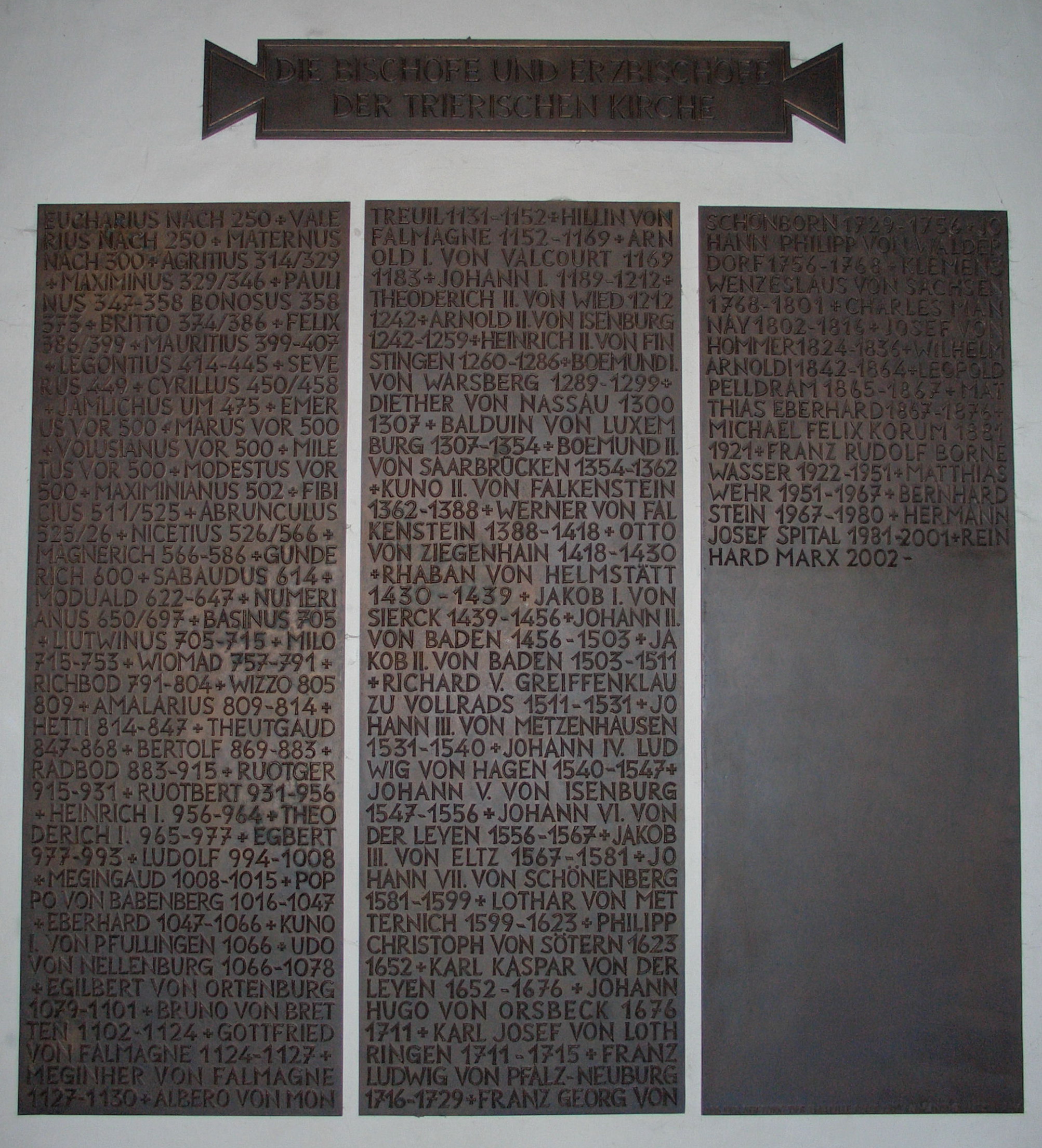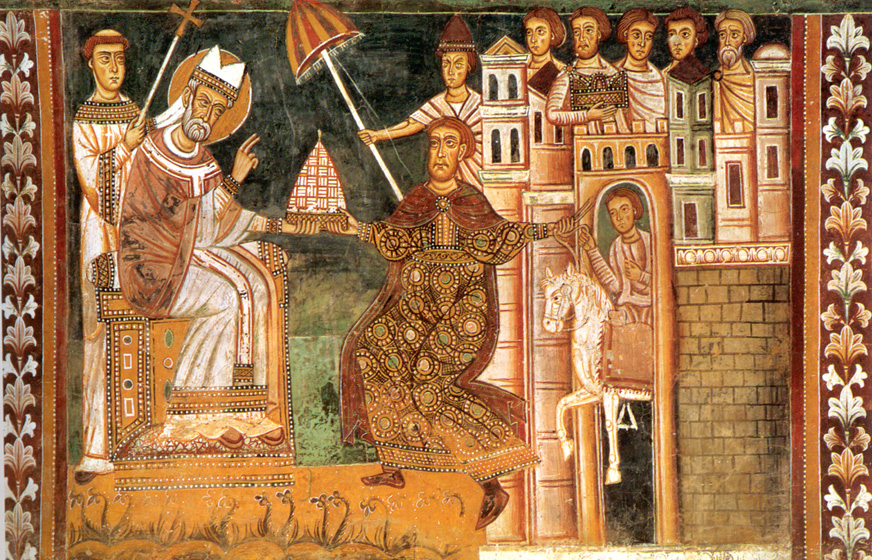|
Volusianus Of Trier
Volusianus was bishop of Trier at the end of the 5th century. Very little is known of his life but he is one of a number of bishops around this time. at NewAdvent.org The rapid succession of bishops named in the late 5th and early 6th centuries indicates the troubled times in the period of transition from the Roman to Frankish rule in Trier, which was itself Frankish by 496. After a period of crisis for the community some stabilisation had apparently occurred under his predecessors. Volusianus has been associated with the so-called New Year's Privilege, referring to the grant by Pope Sylvester I
[...More Info...] [...Related Items...] OR: [Wikipedia] [Google] [Baidu] |
Bishop Of Trier
The Diocese of Trier, in English historically also known as ''Treves'' (IPA "tɾivz") from French ''Trèves'', is a Latin Church ecclesiastical territory or diocese of the Catholic church in Germany."Diocese of Trier" ''''. David M. Cheney. Retrieved February 29, 2016"Diocese of Trier" ''GCatholic.org''. Gabriel Chow. Retrieved February 29, 2016 When it was the archbishopric and Electorate of Trier, it ... [...More Info...] [...Related Items...] OR: [Wikipedia] [Google] [Baidu] |
Christians
Christians () are people who follow or adhere to Christianity, a monotheistic Abrahamic religion based on the life and teachings of Jesus Christ. The words ''Christ'' and ''Christian'' derive from the Koine Greek title ''Christós'' (Χριστός), a translation of the Biblical Hebrew term ''mashiach'' (מָשִׁיחַ) (usually rendered as ''messiah'' in English). While there are diverse interpretations of Christianity which sometimes conflict, they are united in believing that Jesus has a unique significance. The term ''Christian'' used as an adjective is descriptive of anything associated with Christianity or Christian churches, or in a proverbial sense "all that is noble, and good, and Christ-like." It does not have a meaning of 'of Christ' or 'related or pertaining to Christ'. According to a 2011 Pew Research Center survey, there were 2.2 billion Christians around the world in 2010, up from about 600 million in 1910. Today, about 37% of all Christians live in the Am ... [...More Info...] [...Related Items...] OR: [Wikipedia] [Google] [Baidu] |
Pope Sylvester I
Pope Sylvester I (also Silvester, 285 – 31 December 335) was the bishop of Rome from 31 January 314 until his death. He filled the see of Rome at an important era in the history of the Western Church, yet very little is known of him. The accounts of his pontificate preserved in the seventh- or eighth-century '' Liber Pontificalis'' contain little more than a record of the gifts said to have been conferred on the church by Constantine I, although it does say that he was the son of a Roman named Rufinus. His feast is celebrated as Saint Sylvester's Day, on 31 December in Western Christianity, and on 2 January in Eastern Christianity. Pontificate Large churches were founded and built during Sylvester I's pontificate, including Basilica of St. John Lateran, Basilica of the Holy Cross in Jerusalem, Old St. Peter's Basilica and several churches built over the graves of martyrs. Sylvester did not attend the First Council of Nicaea in 325, where the Nicene Creed was formulated, but ... [...More Info...] [...Related Items...] OR: [Wikipedia] [Google] [Baidu] |
Marcus II Of Trier
Marcus, Markus, Márkus or Mărcuș may refer to: * Marcus (name), a masculine given name * Marcus (praenomen), a Roman personal name Places * Marcus, a main belt asteroid, also known as (369088) Marcus 2008 GG44 * Mărcuş, a village in Dobârlău Commune, Covasna County, Romania * Marcus, Illinois, an unincorporated community * Marcus, Iowa, a city * Marcus, South Dakota, an unincorporated community * Marcus, Washington, a town * Marcus Island, Japan, also known as Minami-Tori-shima * Mărcuș River, Romania * Marcus Township, Cherokee County, Iowa Other uses * Markus, a beetle genus in family Cantharidae * ''Marcus'' (album), 2008 album by Marcus Miller * Marcus (comedian), finalist on ''Last Comic Standing'' season 6 * Marcus Amphitheater, Milwaukee, Wisconsin * Marcus Center, Milwaukee, Wisconsin * Marcus & Co., American jewelry retailer * Marcus by Goldman Sachs, an online bank * USS ''Marcus'' (DD-321), a US Navy destroyer (1919-1935) See also * Marcos (other) ... [...More Info...] [...Related Items...] OR: [Wikipedia] [Google] [Baidu] |
Bishop Of Trier
The Diocese of Trier, in English historically also known as ''Treves'' (IPA "tɾivz") from French ''Trèves'', is a Latin Church ecclesiastical territory or diocese of the Catholic church in Germany."Diocese of Trier" ''''. David M. Cheney. Retrieved February 29, 2016"Diocese of Trier" ''GCatholic.org''. Gabriel Chow. Retrieved February 29, 2016 When it was the archbishopric and Electorate of Trier, it ... [...More Info...] [...Related Items...] OR: [Wikipedia] [Google] [Baidu] |
Gallo-Roman Saints
Gallo-Roman culture was a consequence of the Romanization of Gauls under the rule of the Roman Empire. It was characterized by the Gaulish adoption or adaptation of Roman culture, language, morals and way of life in a uniquely Gaulish context. The well-studied meld of cultures in Gaul gives historians a model against which to compare and contrast parallel developments of Romanization in other, less-studied Roman provinces. ''Interpretatio romana'' offered Roman names for Gaulish deities such as the smith-god Gobannus, but of Celtic deities only the horse-patroness Epona penetrated Romanized cultures beyond the confines of Gaul. The barbarian invasions beginning in the late third century forced upon Gallo-Roman culture fundamental changes in politics, in the economic underpinning, in military organization. The Gothic settlement of 418 offered a double loyalty, as Western Roman authority disintegrated at Rome. The plight of the highly Romanized governing class is examined by ... [...More Info...] [...Related Items...] OR: [Wikipedia] [Google] [Baidu] |
Saints Of Germania
In religious belief, a saint is a person who is recognized as having an exceptional degree of holiness, likeness, or closeness to God. However, the use of the term ''saint'' depends on the context and denomination. In Catholic, Eastern Orthodox, Anglican, Oriental Orthodox, and Lutheran doctrine, all of their faithful deceased in Heaven are considered to be saints, but some are considered worthy of greater honor or emulation. Official ecclesiastical recognition, and consequently a public cult of veneration, is conferred on some denominational saints through the process of canonization in the Catholic Church or glorification in the Eastern Orthodox Church after their approval. While the English word ''saint'' originated in Christianity, historians of religion tend to use the appellation "in a more general way to refer to the state of special holiness that many religions attribute to certain people", referring to the Jewish tzadik, the Islamic walī, the Hindu rishi or Sikh gur ... [...More Info...] [...Related Items...] OR: [Wikipedia] [Google] [Baidu] |
Year Of Birth Unknown
A year or annus is the orbital period of a planetary body, for example, the Earth, moving in its orbit around the Sun. Due to the Earth's axial tilt, the course of a year sees the passing of the seasons, marked by change in weather, the hours of daylight, and, consequently, vegetation and soil fertility. In temperate and subpolar regions around the planet, four seasons are generally recognized: spring, summer, autumn and winter. In tropical and subtropical regions, several geographical sectors do not present defined seasons; but in the seasonal tropics, the annual wet and dry seasons are recognized and tracked. A calendar year is an approximation of the number of days of the Earth's orbital period, as counted in a given calendar. The Gregorian calendar, or modern calendar, presents its calendar year to be either a common year of 365 days or a leap year of 366 days, as do the Julian calendars. For the Gregorian calendar, the average length of the calendar year ( ... [...More Info...] [...Related Items...] OR: [Wikipedia] [Google] [Baidu] |
Year Of Death Unknown
A year or annus is the orbital period of a planetary body, for example, the Earth, moving in its orbit around the Sun. Due to the Earth's axial tilt, the course of a year sees the passing of the seasons, marked by change in weather, the hours of daylight, and, consequently, vegetation and soil fertility. In temperate and subpolar regions around the planet, four seasons are generally recognized: spring, summer, autumn and winter. In tropical and subtropical regions, several geographical sectors do not present defined seasons; but in the seasonal tropics, the annual wet and dry seasons are recognized and tracked. A calendar year is an approximation of the number of days of the Earth's orbital period, as counted in a given calendar. The Gregorian calendar, or modern calendar, presents its calendar year to be either a common year of 365 days or a leap year of 366 days, as do the Julian calendars. For the Gregorian calendar, the average length of the calendar year (the mea ... [...More Info...] [...Related Items...] OR: [Wikipedia] [Google] [Baidu] |
5th-century Christian Saints
The 5th century is the time period from 401 ( CDI) through 500 ( D) ''Anno Domini'' (AD) or Common Era (CE) in the Julian calendar. The 5th century is noted for being a period of migration and political instability throughout Eurasia. It saw the collapse of the Western Roman Empire, which came to an end in 476 AD. This empire had been ruled by a succession of weak emperors, with the real political might being increasingly concentrated among military leaders. Internal instability allowed a Visigoth army to reach and ransack Rome in 410. Some recovery took place during the following decades, but the Western Empire received another serious blow when a second foreign group, the Vandals, occupied Carthage, capital of an extremely important province in Africa. Attempts to retake the province were interrupted by the invasion of the Huns under Attila. After Attila's defeat, both Eastern and Western empires joined forces for a final assault on Vandal North Africa, but this campaign was ... [...More Info...] [...Related Items...] OR: [Wikipedia] [Google] [Baidu] |








